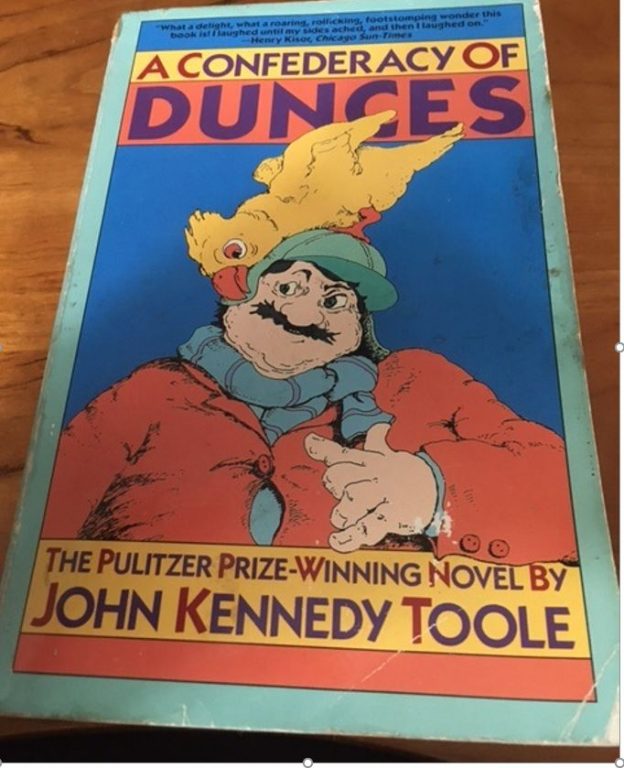The plot concerns Ignatius’s long war of attrition against the 20th Century ~ Juvenal Early
By Juvenal Early
New Orleans (N’awlins, as they say in the South) has always been a city full of characters. Port cities are like that, and, as the Mississippi River’s window on the world, New Orleans has been the ne plus ultra of character cities, throughout its colorful history. It’s a veritable bouillabaisse of Acadians, swarthy Mediterranean types, rednecks, Cajuns, Creoles, Africans, Arabs, and anyone else who ever went down to the sea in ships. The most Catholic of cities, New Orleans did Carnival so well, its Mardi Gras became a major industry. Throw in jazz, politics, the Mafia, the flesh trade, and several quirky genius chefs, and you’ve got an unusually high quotient of characters.
Set in The Big Easy, John Kennedy Toole’s Pulitzer-Prize-winning novel A Confederacy of Dunces (© 1976), gave the world Ignatius J. Reilly, a latter-day Thomist, a Medievalist, a Grand Inquisitor, a man for whom the standard New Orleans character was degeneracy incarnate. Given his druthers, Ignatius would’ve chosen to live in a world purged of said characters. Fictional though he was, Ignatius has ended up becoming perhaps the grandest New Orleans character of them all. In homage, the real people of New Orleans erected a statue to Ignatius, and right on Canal Street.
Ignatius is fat, unkempt, lives with his mother, is a perpetual student of Medieval philosophy, and critic pop culture. He complains constantly about the misery visited upon him by his faulty pyloric valve (abused as it is, by Ignatius’s diet). As described in the book’s first paragraph, he is distinguished by his odd dress: baggy pleated trousers, oversized flannel shirt, a scarf, and topped off by a green hunting cap with earflaps—all this, mind you, in one of the capitals of The Long Hot Summer.
The plot concerns Ignatius’s long war of attrition against the 20th Century. The elevated language he spouts in defense of his worldview—and the way people react to it—makes for non-stop Rabelaisian pageantry.
A Confederacy of Dunces is a picaresque novel, lurching hilariously from one episode to the next, from one lively conversation to another. Ignatius is a man who can attract the wrong kind of attention just by waiting for his mother in front of a store. Whenever he speaks to people—which is often—he gets deeper into trouble. Completely without self-awareness, he insults virtually everyone whose path he crosses, assuming they’ll take it as constructive criticism from someone who obviously knows better. By the end of the book, he’s pissed off everyone to high heaven, and they all want a piece of him. The clashes and conflicts, conflated into his conversation, makes for some of the best social satire of the Sixties.
Irene Reilly wants her son to get a job. Setbacks old and new have depleted the family nest egg, and they need a new revenue source. As man of the house, Ignatius must sally forth and be the breadwinner, but his long college training in Boethius and the Middle Ages have fitted him for nothing outside of academics, and he burned his bridges there long ago. What to do? Reluctantly, Ignatius, age 30, begins his search.
He quickly lucks into a job with Levy Pants, a moribund sweatshop. The loyal but dull-witted office manager, impressed by Ignatius’s pompous language, hires him as a file clerk. Whereupon Ignatius dumps the company records in the garbage, fills the file cabinets with plants, and writes insulting letters to the company’s biggest customers. For good measure, he organizes the labor force—mostly black—and impels them to attack the company office, the vanguard holding a banner—made from one of Ignatius’s crusted sheets—proclaiming a “Crusade for Moorish Dignity.” He is, of course, summarily fired.
Next, Ignatius finds work pushing a hotdog cart for Paradise Vendors, Inc., and, of course, he ends up eating much more than he sells. His pyloric valve, as he tells everyone, completely shuts down. Dressed up as a pirate—head bandanna, sash, plastic cutlass, and earring—he roams the French Quarter, looking to cash in on the tourist trade (ironic, of course, since most tourists come to the French Quarter specifically for the great variety of Creole, Cajun, and Southern cooking). He catches the eye of a prominent member of the gay community—a sodomite, as Ignatius would say. Initially appalled, Ignatius hits on a brainstorm. If gays can be organized politically, they will eventually take over. Taking power, they will also control the military, rendering it effeminate, ineffective, and fabulous! A non-aggressive US Army means World Peace. It all fits into Ignatius’s master plan. (Hey! It’s not all that farfetched.) Ignatius sets to work with predictable results.
There is much more: the conflict at home with his mother; forays to the local movie palace, where he declaims loudly about the degradation of cinematic art; a couple visits to The Night of Joy, a Bourbon Street skin joint, where Ignatius hopes Boethius will save the world from its worst appetites. The plot builds and builds to the inevitable denouement and the unlikely Deus Ex Machina.
Most scenes are replete with wonderfully lively dialogue, at once zany and…well, altogether real. Toole knew his hometown and he captures the peculiar Brooklynese patois heard among certain of its down-market denizens (think Stanley Kowalski). Wondrous too is the elevated pomposity of Ignatius, truculence as poetry. As a special bonus, Toole throws in Mr Burma Jones, doubtless the greatest black character ever created by a white writer.
But why take my word for it. Let the book speak for itself.
There is conflict:
“You got any identification, mister?” the policeman asked…
“What?” Ignatius looked down upon the badge on the blue cap. “Who are you?
“Let me see your driver’s license.”
“I don’ t drive. Will you kindly go away? I am waiting for my mother.”
“What’s this hanging out your bag?”
“What do you think it is, stupid? It’s a string for my lute.”
“What’s that?” The policeman drew back a little. “Are you local?”
“Is it the part of the police department to harass me when this city is a flagrant vice capital of the civilized world?” Ignatius bellowed over the crowd in front of the store. “This city is famous for its gamblers, prostitutes, exhibitionists, anti-Christs, alcoholics, sodomites, drug addicts, fetishists, onanists, pornographers, frauds, jades, litterbugs, and lesbians, all of whom are only too well protected by graft. If you have a moment, I shall endeavor to discuss the crime problem with you, but don’t make the mistake of bothering me.”
Movie commentary (during a public screening):
Popcorn spilled down his shirt and gathered in the folds of his trousers. “What degenerate produced this abortion?”
“Shut up,” someone said behind him.
“Just look at those smiling morons!” …
When a love scene appeared to be developing, he bounded up out of his seat and stomped up the aisle to the candy counter for more popcorn, but as he returned to his seat, the two big pink figures were just preparing to kiss.
“They probably have halitosis,” Ignatius announced over the heads of children. “I hate to think of the obscene places that those mouths have doubtlessly been before.”
Criticism of the Ladies Art Club:
“Oh, my God!” Ignatius bellowed…” How dare you present such abortions to the public!”
“Please move along, sir,” a bold lady said…
“You ladies need a course in botany. And perhaps geometry, too.”
“You don’t have to look at our work,” an offended voice said…
“Yes, I do!” Ignatius screamed. “You ladies need a critic with some taste and decency…The water in this bowl looks like motor oil.”
Helpful Race Relations:
“Shit! You think I like the Night of Joy? Ooo-wee. I wanna get someplace. I want to get someplace good, be gainfully employ, make me a livin wage.”
“Just as I suspected,” Ignatius said angrily. “In other words, you want to become totally bourgeois. You people have all been brainwashed. I imagine you’d like to become a success or something equally vile.”
“Hey, now you gettin me. Whoa!”
“I really don’t have the time to discuss the errors of your value judgements.”
Don’t forget LGBT:
“Please be serious for a moment. Stop fluttering around here.”
“Moi? Fluttering? What do you want, Gypsy Woman?”
“Have you people thought of forming a political party and running a candidate?”
“Politics? Oh, Maid of Orleans. How dreary.”
“This is very important!” Ignatius shouted …”you may hold the key to the future.”
“Well, what do you want to do about it, Eleanor Roosevelt?”
“You must start a party organization. Plans must be made.”
“Oh, please,” the young man sighed…
“You may be able to save the world!” Ignatius bellowed in an orator’s voice….
“This kind of conversation depresses me more than you could ever imagine,” the young man told him.
And the aforementioned Burma Jones at the Night of Joy:
“You oughta tell your customer use they ashtray, tell them peoples you workin a man in here below the minimal wage. Maybe they be a little considerate.’
“Listen here, Jones” Lana Lee (said)…” All I gotta do is phone the police and report you’re out of work. You understand me?”
“And I tell the po-lice the Night of Joy a glorify cathouse. I fall in a trap when I come to work in this place. Whoa! Now I jus waitin to get some kind of evidence. When I do, I really gonna flap my mouth at the precinct.”
“Watch your tongue.”
“Times changin,” Jones said, adjusting his sunglasses. “You cain scare color peoples no more. I got me some peoples form a human chain in front of your door, drive away your business, get you on TV news.”
When Ignatius is home alone, he fills Big Chief writing tablets with his unique invective, gems of nihilism, as his half-foe/half-ally Myrna Minkoff describes it:
I can at last describe to you our factory…The scene which met my eyes was at once compelling and repelling. The original sweatshop has been preserved for posterity at Levy Pants. If only the Smithsonian Institution, that grab-bag of our nation’s refuse, could somehow vacuum-seal the Levy Pants factory and transport it to the capital of the United States of America, each worker frozen in an attitude of labor, the visitors to that questionable museum would defecate into their garish tourist outfits. It is a scene which combines the worst of Uncle Tom’s Cabin and Fritz Lang’s Metropolis; it is mechanized Negro slavery; it represents the progress which the Negro has made from picking cotton to tailoring it.
You won’t want to put this novel down. But you also won’t want to rush through it. You’ll want to savor every dialogue. There’s nothing else like it. Sadly.
Everyone loves this novel. Everyone I know who’s read it is also saddened, disappointed, and angered to know that it’s all we’ve got. John Kennedy Toole spent most of the 60s writing A Confederacy of Dunces and trying to get it published. Failing in the latter, he took his own life in 1969. His mother, believing ardently in her son’s genius, shopped the manuscript around, until she was finally able to press it into the hands of another Louisiana novelist, Walker Percy. In the novel’s preface, Percy describes how he reluctantly took up the dog-eared pages and was dismayed, after reading the first few pages, to find that it wasn’t bad enough to dismiss. He read on and gradually came to relish its genius. He managed to find a publisher for it, and a year later it won the Pulitzer Prize. See if you don’t think it’s not the funniest novel you’ve ever read.
I could say a lot more about the book. Subplots involving a half-dozen of the novel’s eccentrics; Toole’s not-so-hidden messages; the sexual tension between Ignatius and Myrna Minkoff; strippers and cockatoos; theology, geometry, and the consolation of philosophy. But in the end, it’s just a great book to read. What’s it all mean? Who knows? Just read it.
With apologies to Walker Percy’s The Moviegoer (which is the great Mardi Gras novel), A Confederacy of Dunces is the great New Orleans novel.
*******
“Juvenal Early” is a contributor to Barely A Blog. His first essay was “The Dissident Right Has An Idiocracy Problem.” It made waves! He has a BAB archive.





